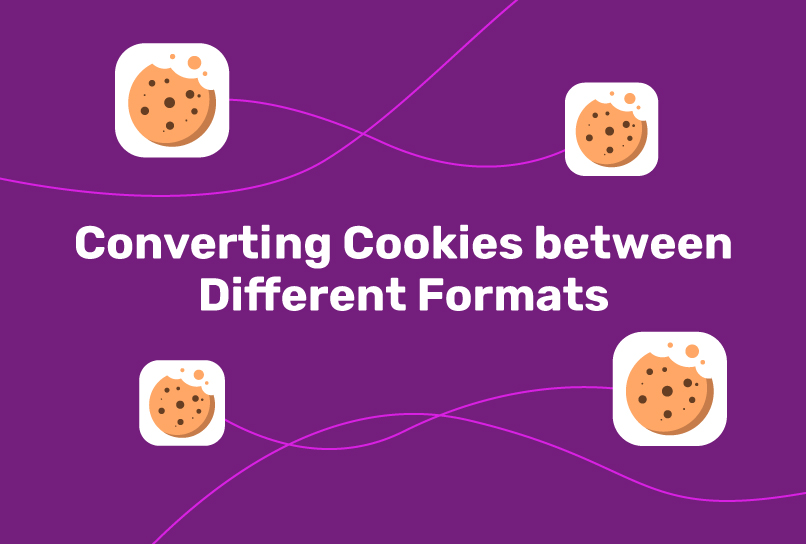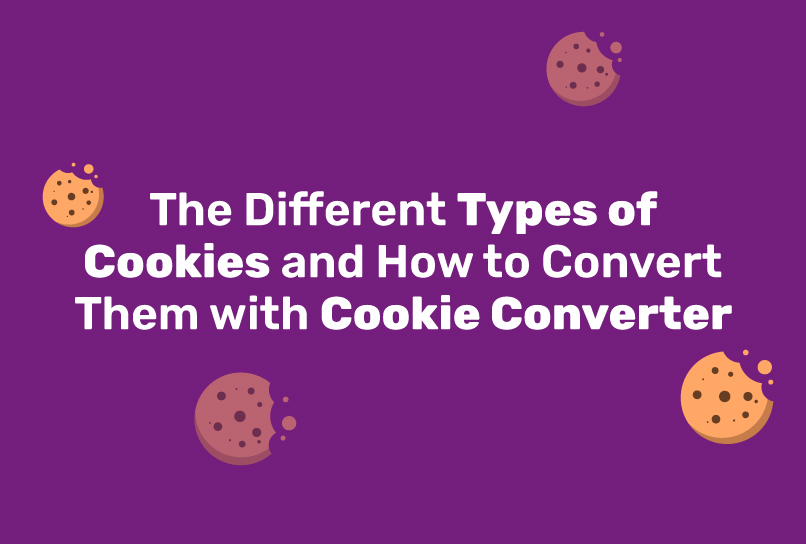Far from their interesting name, cookies are an essential part of the internet, as evidenced by the EU stepping in via the GDPR to regulate their usage.
Cookies are small text files that are stored on a user’s browser and device by a website to collect personal data. These tiny data packets stored on your browser play are the main reason why websites magically remember your preferences, logins, or shopping carts.
More so, as evidenced by third-party cookies, websites also use them to track users through the corners of the internet they visit.
In this blog post, we will explore the different types of cookies, their formats, and the process of converting them using www.cookieconverter.com.
How Do Cookies Work and What are the Types of Cookies?

When you visit a website, it sends your browser small pieces of information that get stored on your device. These “notes” contain details like your login information, site preferences, or items in your online cart.
Next time you visit, the website recognizes your cookies and tailors your experience accordingly. It’s a digital handshake, reminding the website who you are and what you like.
There are different ways to classify cookies; some classify them as essential and non-essential cookies, first-party and third-party cookies, and session and persistent cookies.
Another way to classify cookies is to base them on what they do: Functional cookies, Performance cookies, and Advertising cookies.
Functional cookies allow users to use the fundamental features of a website, while performance cookies track online movements, using the data to improve the website’s performance. Advertising cookies, on the other hand, are used by businesses to increase their engagement and as a way to target a wider audience across websites.
Cookies also come in different formats, each with its own strengths and uses. The most common are:
- JSON: This human-readable format stores cookie data like key-value pairs, making it easy to understand and edit (think of it as a simple list).
- Netscape: This traditional format was used in older browsers and is still widely supported. It’s less readable than JSON but often compatible with older systems.
- Base64-encoded Cookies: These kinds of cookies are either of the above but encoded in Base64, a complex format that translates text into a compact string of characters for extra security. So you can either have Base64 Encoded JSON or a Base64 Encoded Netscape.
Cookies and Enhancing Reliability of Browser Profiles
Using anti-detect browsers like Incognition helps you maintain your digital privacy by making it difficult to track your browsing activities via browser fingerprinting. However, this is partly impossible without cookies.
Websites and online platforms use various techniques to identify individual users, often by analyzing their browser fingerprints. A browser fingerprint includes elements of your browser and device that can be used to differentiate you from other users.
Things like installed fonts, plugins, device OS, and cookies are often combined to create this unique ID. An anti-detect browser spoofs and masks these elements except cookies.
For example, in Incogniton, each browser profile is linked to a separate browser fingerprint and as such you can access the same website from the same PC with different accounts and they won’t be connected to each other.
However, the slight issue returns when you have to access the website again, especially if you didn’t clear the cookies once you were done browsing.
The website might be able to link your accounts to each other if you don’t use the same browser profile to access the same website you used before. Also, you would lose the seamless experience that comes with the website remembering all your preferences from the previous session.
It is only by ensuring the cookies match your profile and remain consistent over time that you can reduce the risk of detection and maintain a seamless online experience.
Now, you might be wondering – why is this so important?
Having consistent cookies increases the reliability of browser profiles by storing information while a user is browsing a website. This means that the browser won’t have to reauthenticate the user for every web page they visit, and it can remember the user’s preferred settings and themes.
Well, some online activities rely heavily on maintaining consistent browser profiles. Think about it like trying to blend in with a crowd – if you keep changing your clothes and hairstyle, people might notice something’s off. This same way websites can detect irregularities in browser interactions and flag them.
Converting Cookies between Different Formats

Sometimes cookies are only available in certain formats, but users might need a different format. So what do you do when you encounter cookies in different formats? You will need to use a cookie converter.
Converting cookies is often necessary for various situations. Perhaps you:
- Switched browsers: Your new browser might not recognize cookies saved in the old format. For example, if you switch from a regular browser to an antidetect browser, you might be sure the cookie format for both browsers matches each other, otherwise, you will have to find a way to convert the cookies to the desired format.
- Encountered compatibility issues: Some websites or tools may only accept cookies in a particular format. So to ensure that the website or tool functions correctly and provides you with the intended user experience, you will need to convert your cookies to the required format.
- Used a cookie collector: Anti-detect browsers like Incogniton offer a cookie collector feature that helps you import and export cookies so that you can deploy them anytime you need them. It saves you the manual effort of copying and keeping the cookies from the browser profiles when you have to use them for something else.
So, if you have used a cookie collector to gather cookies from multiple browsers, you may encounter issues with compatibility when trying to use them on a specific browser or website. In this case, you will need to convert the collected cookies to the format supported by the browser or website you intend to use.
- Want to edit or encrypt cookies: Some advanced tasks require converting cookies to specific formats for effectiveness. For example, if you want to edit or encrypt cookies for security purposes, you will need to convert them to a format that supports these actions. This ensures that the cookies can be modified or encrypted without losing any important data.
Additionally, converting cookies to specific formats can also improve their effectiveness in certain tasks, such as tracking user behavior or personalizing website content. Overall, the ability to convert cookies to different formats is crucial in ensuring compatibility and maximizing their functionality across multiple browsers and websites.
In these cases, tools like cookieconverter.com can be used to convert cookies between different formats. This tool allows users to convert cookies between the Netscape and JSON format and also allows for base64 encoded cookies. It has a user-friendly, secure platform designed to make cookie conversion a breeze.
Here’s why cookieconverter.com is your go-to solution:
- Supports all major formats: Convert between JSON, Netscape, and Base64-encoded variations with ease.
- Fast and efficient: No more waiting hours for conversions. Enjoy lightning-speed processing for all your cookie needs.
- Simple and intuitive: No coding knowledge required! The user-friendly interface makes conversion accessible to everyone.
- Secure and reliable: Rest assured your cookies are safe with industry-standard security measures in place.
- Free to use: Basic conversions are readily available without any cost, making it the perfect tool for casual users and professionals alike.
Whether you’re a tech-savvy professional or a curious beginner, the intuitive interface and clear instructions guide you through the process effortlessly. The cookieconverter.com automatically optimizes the conversion process based on your chosen format, ensuring maximum compatibility and functionality.
How to Convert Cookies Using cookieconverter.com
Using the cookieconverter.com tool is quite simple and in three steps described below, you will go from having cookies in an undesirable format to the format you want.
- Step 1: Paste your cookie
Simply copy and paste your cookie text (regardless of the format) into the designated field.
- Step 2: Choose your output format.
Select the desired format you want to convert to (JSON, Netscape, or Base64).
- Step 3: Click the “Convert” button and wait for the conversion process.
And voila! Your converted cookies will be presented to you once the process is done.
Conclusion
Cookies form the backbone of our online experiences by enabling websites to remember user details and preferences. However, they come in multiple formats which can cause compatibility issues at times. Thankfully, tools like cookieconverter.com provide an easy way to overcome these challenges.
With its user-friendly interface, fast processing speeds, and support for all major cookie formats, cookieconverter.com simplifies what could otherwise be a technically demanding task. Whether you want to resolve browser conflicts, improve cookie functionality, or bolster online security, cookie conversion is an invaluable skill to add to your toolkit.
So next time you need to convert cookies to a desired format, turn to CookieConverter and breathe new life into your digital projects in just three quick steps.


Comments are closed.